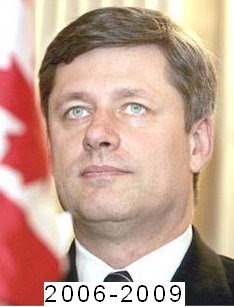The latest Harris Decima poll provides more bad news for the Conservatives. With the very large sample size, the Liberal lead is outside of the margin of error (2.2):
Libs 32%
Cons 29%
NDP 16%
Greens 11%
Bloc 9%
We see a 3% drop for the Conservatives from the last Decima poll, and this is the first time any pollster has put them in the 20's since their election. No regionals yet, except for the broad strokes:
But they trailed the Bloc and Liberals in Quebec, were behind the Liberals in Ontario and were in a second-place tie with the Liberals in British Columbia, where the NDP has top spot.
The pollster refers to the numbers as a "slim lead". The last HD poll was a statistically tie, and this is the first time HD has given the Liberals a lead outside of MOE, a trend we've seen elsewhere. The NDP are up 2% from the last poll, to a more respectable level. I'm quite curious what the BC numbers look like, because with a 2000 sample size, the regionals probably have more weight.
Although there is some slight variation in raw totals, HD confirms the same trends. Liberals lead in Ontario, Conservatives no longer competitive in Quebec and clear signs of erosion elsewher
UPDATE:
Regionals:
But in Ontario, which accounts for one-third of the seats in the House of Commons, the Conservatives were nine-points behind the Liberals,with 31 per cent and 40 per cent respectively. The NDP had 15 per cent support and the Greens 14 per cent.
In Quebec, the Tories have fallen to a distant third, with 12 per cent support compared to 40 per cent for the Bloc, 31 per cent for the Liberals, nine per cent for the NDP and five per cent for the Greens.
And in B.C., the Tories have slipped into a second-place tie with the Liberals (26 per cent each), while the NDP has pulled into a slim lead with 29 per cent support. The Greens had 16 per cent.
In Atlantic Canada, the Liberals continued to maintain a strong advantage, with 41 per cent, compared to 27 per cent for the Tories, 25 per cent for the NDP and six per cent for the Greens.
The only bright spot for the Conservatives was in the Prairies, wherethey already hold all but seven seats and, thus, have little to gain. In Alberta, the poll suggests the Tories continued to dominate with 55 per cent support, compared to 19 per cent for the Liberals, 14 percent for the Greens and 10 per cent for the NDP.
In Manitoba-Saskatchewan, the poll pegged Conservative support at 46per cent, to 23 per cent for the Liberals, 16 per cent for the NDP and11 per cent for the Greens.
This is the first poll to put the Conservative support so low in British Columbia. For context, the last HD poll had the Conservatives at 38% in the province. I've floated before, that the recession is just now taking a strong hold in British Columbia, curious if this would move the numbers. We've some evidence elsewhere of a slight shift, this poll would tend to confirm that. A strong showing for the NDP, one has to wonder if the provincial election is affecting the numbers.
These regionals show a disasterous concoction for the Conservatives. Another absymal number in Quebec, which looks more plausible with each replicated result. A virtual shutout is a real possibility, and the Liberals are clearly emerging as the only true federalist option. While the Liberals national number is steady, relative to the last poll, in Ontario a 4% lead is now a impressive 9% edge.
Drilling down into the regionals, this HD poll represents a comfortable minority for the Liberals.





